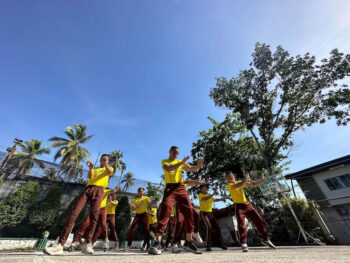SOUTH BEND, Indiana, USA (MindaNews/06 September) – Watching CNN’s coverage of the massive devastation resulting from Hurricane Dorian’s impact on the Bahamas – for so long the darling resort of elite tourists around the world – one recalls all the other major storms that have pummeled planet Earth including Haiyan (local name – Yolanda) just a few years ago. The dramatic footages unfolding on the TV screen taken as soon as cameras could shoot and forwarded to TV stations showed the island almost annihilated by the strong winds followed with the floodwaters. Even as this essay is being written, Dorian is on its way to the eastern coast of the U.S.A. with fears that the two Carolina states would also be hit furiously.
And to think that just before Dorian’s tragic entry into humanity’s common home, the fires spreading across the Amazon forests covering not just Brazil but other countries such as Columbia, Peru and Bolivia continued to destroy vast areas of what are considered “the lungs of the earth.” Even as everyone including politicians and corporate heads publicly declared how tragic these forests fires are, they would be the first to deal with the root-causes why the fires have occurred. And in the case of the President of Brazil, he even refused assistance from other countries to control the further spread of the fires because of political reasons, including his desire to not lose face considering that it was his policies of expanding corporate extractions of the Amazon’s resources that has triggered the new occurrence of these fires.
In the past weeks, various parts of the Philippines also experienced LPAs bringing heavy rains and floods. In some of the low-lying areas of Davao City from Bangkal to Los Amigos, rivers overflowed causing floods that destroyed hundreds of houses causing untold suffering on the victims. We are only in early September and there are more months before we say goodbye to 2019. So far, we haven’t had yet the major catastrophes such as Sendong and Pablo and we can only pray that within the next few months we will be spared such calamities.
But we are all beginning to realize that the new normal across the planet is the occurrence of more and more natural calamities as there has been no let-up to the worsening climate change. Despite the continuing urgent call of scientists, ecological advocates and no less than Pope Francis, our collective response to arrest global warning remains lukewarm. The recent death of Ms. Gina Lopez mainly underscored the absence of the State’s political will to sustain her legacy. Despite their clear impact on climate change, the mining and coal-fire power industries – fully supported by the State and its military instrumentalities – continue to assert their colonizing power over the entire population and our environment.
The Church tries to provide a counter-witness, although on the whole her stance can fluctuate from being prophetic to not so pro-active. But at least at the level of words, her prophecy can be quite striking. Take a look at the most recent CBCP statement – AN URGENT CLL FOR ECOLOGICAL CONVERSION, HOPE IN THE FACE OF CLIMATE EMERGENCY – signed by the CBCP President, Archbishop Romulo Valles and issued last 16 July 2019. One paragraph states: “Climate-related disasters threaten us all. The reality of the climate crisis, proven by the catastrophic impact of typhoons and other human induced-disasters, has made us aware that the time to act is now, not tomorrow. We must activate climate action on behalf of the voiceless people and the planet.”
Among the environmental issues the statement pointed to as causing the need for climate emergency include mining, building of dams and our growing dependence on fossil fuel-based energy such as coal thus necessitating the building of more coal-fired power plants. These extractive industries that also include the expansion of agri-business plantations using a lot of toxic fertilizers and insecticides have all threatened the rich biodiversity of our islands. “The burning of coal and other fossil fuels and the destruction of nature are natural consequences of extractive mining.” Apart from climate change, another consequence of undeterred extractive industries is the violence that such industries promote especially in the uplands, impacting on the lives of indigenous peoples.
When violence erupts, peacebuilding becomes problematic because the State is unable to facilitate peaceful settlements. Clearly, its earlier efforts at setting up peace negotiations were bound to fail as the State is more at home in waging war rather than brokering for lasting peace. But the work to facilitate peacebuilding in situations of conflict brought about by the abuses committed by extractive industries remains quite urgent.
It is in this context that the Catholic Peace Network (CPN) of the Kroc Institute for International Peace Studies of the University of Notre Dame (in South Bend, Indiana USA) came up with a project – CATHOLIC PEACEBUILDING AND EXTRACTIVES: INTEGRAL PEACE, DEVELOPMENT AND ECOLOGY. On 5-7 September 2019, the CPN IS bringing together 18 scholars representing various disciplines (Philosophy, Anthropology, Theology, Social Ethics, Development Studies, Human Rights & Peace Advocates) and coming from various countries (U.S.A., Peru, El Salvador, Mexico, Colombia, Congo, Kenya and the Philippines). The project they are committed to aims to be a groundbreaking work of scholarship that will help fill gaps in the academic literature and better connect that literature to the Church’s practice. Considerable scholarly work has been done on development ethics, environmental ethics, and corporate social responsibility with respect to nature resources, in general, and extractives, in particular.
(More on this conference in a Part II Report).







